This blog post is the second part of the ‘Water-soluble vitamins’ blog post series.
Read the first part of the blog post here: Water-soluble vitamins
Identify the vitamin – 5
Like other B-vitamins, this vitamin also helps break down the food molecules into energy.
This vitamin helps in the formation of red and white blood cells in your body. It is required for the production of hemoglobin (in the blood), which transports oxygen throughout the body. It also aids your body in the production of insulin. Insulin, in turn, regulates the glucose levels in your body by helping cells absorb glucose in food to produce energy.
The nervous system is responsible for conveying the information from the brain to other parts of the body and vice-versa. It is composed of neurons. These neurons communicate with each other by releasing neurotransmitters. This vitamin is involved in the synthesis of specific neurotransmitters that regulate your mood and sleep cycles.
Along with B9 and B12, it helps reduce the levels of a dangerous amino acid in your body. This amino acid (Homocysteine), produced by eating meat, can cause depression, increase the risk of Alzheimer’s disease, and heart disease.
It might also reduce the feeling of nausea and morning sickness during pregnancy.

Deficiency
The deficiency of this vitamin can occur in people with drinking problems, kidney failure, and liver diseases. This deficiency can also occur due to malnutrition and some medications which suppress this vitamin. But, it is rare among healthy people.
Since this vitamin is so important to your body, its deficiency can cause a multitude of problems. If left untreated, it can be fatal.
Symptoms include a weak immune system, anemia, seizures, depression, confusion, nervousness, skin rashes, cracked lips, muscle weakness, and numbness.
Overconsumption
Even though this vitamin is vital to several processes in your body, overconsumption can be harmful to the body.
Taking more than 100mg/day of this vitamin can cause nausea, dizziness, and sensitivity to sunlight. Higher doses of more than 200mg/day could lead to imbalance and loss of feeling in the legs.
Which vitamin is it?
Vitamin B6 (Pyridoxine)
Sources
The graphs below show the RDA data for B6, as well as the amount of vitamin B6 contained in different food items. For infants less than a year old, RDA is not known. Hence AI is used instead. For these age groups, UL is also not known.
Note: All values are in milligrams
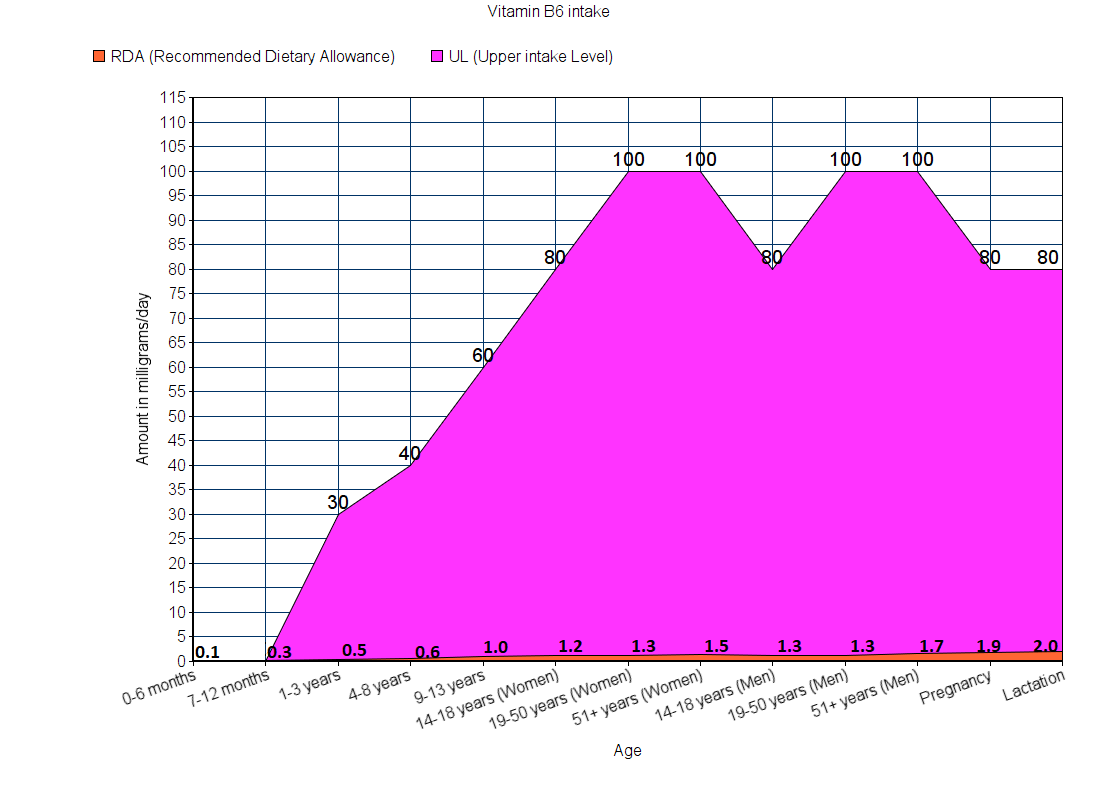
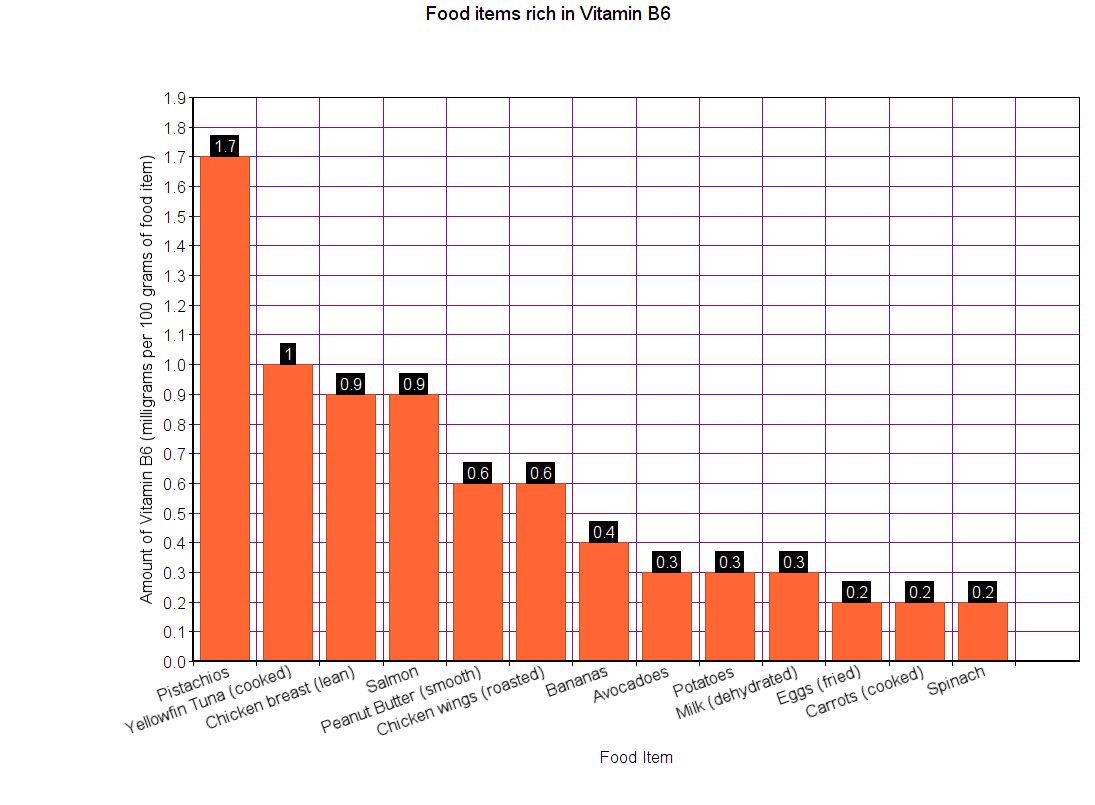
Best practices
How to absorb vitamin B6 better?
Eat a variety of food items – vegetables, fruits, milk products, whole grains, oils, lean meats, fish, eggs, nuts, and seeds. They are all rich in vitamin B6.
Eat a lot of raw foods (vegetables, fruits, nuts, and seeds) because vitamin B6 is destroyed by heat. Sunlight also destroys vitamin B6. So, store these items in a dark place.
Who should take supplements?
It is advisable to try to take all your vitamins from your diet. However, unlike healthy people, some people might have trouble absorbing vitamin B6. People belonging to the following categories might benefit from vitamin B6 supplements:
- Alcoholics
- People with poor intestinal absorption
- People who take medications or drugs like corticosteroids, estrogens, and anticonvulsants
- Children and Older people who are B6 deficient mildly
- People suffering from kidney disease, hyperthyroidism, inflammatory bowel disease, and autoimmune disorders
However, it is advisable to consult a doctor before taking vitamin B6 supplements, since it can interfere with some medications.
How long does it take for your body to absorb the vitamin completely?
Your body can absorb almost 100% of vitamin B6 you eat within 24 hours.
How long does the vitamin stay in the body?
Most of the vitamin B6 you eat is excreted through urine within 24 hours.
What happens to any excess of the vitamin you consume?
Normally, any excess vitamin B6 you eat is removed through the urine. However, when you overeat vitamin B6 regularly, it might be stored in organs like the liver and kidneys. This can become dangerous in the long run.
Food vs. supplements
Natural forms of vitamin B6 might be stored better in your body. However, it is difficult to obtain all the required RDA of vitamin B6 from the food alone.
Identify the vitamin – 6
This vitamin was known as vitamin H (Haut or Haar – skin or hair in German) because people took it as a supplement to keep the skin, hair, and nails healthy. However, its benefit in these areas is not proven.
Like other B vitamins, it helps break down proteins, fats, and carbohydrates.
It helps in the transfer of Carbon-dioxide from the cells to the lungs.
Since it aids the growth of the embryo, it becomes a vital vitamin during pregnancy.

Deficiency
Besides being present in various food items, bacteria in the intestines can also make small amounts of this vitamin. Hence, the deficiency of this vitamin is very rare among healthy individuals.
However, smokers can suffer from a deficiency of this vitamin. Raw egg whites contain a substance that can reduce the body’s ability to absorb this vitamin. More than 60% of it is lost upon cooking. Hence, if you drink a lot of raw egg whites, you are at risk of this deficiency.
The deficiency of this vitamin can cause
- Hair loss, dry eyes, sore tongue, and red rash and scaly skin near the eyes, nose, mouth and genitals
- Nausea, vomiting, and loss of appetite
- Lack of sleep, depression, and hallucinations
- Numbness and tingling sensation in arms and legs.
Overconsumption
This vitamin is a water-soluble vitamin. So, problems due to overconsumption are very rare, since the body removes any excess amount through urine, without storing it.
However, the symptoms of toxicity due to overconsumption include skin allergies, excessive thirst, urination, insomnia, and lower levels of vitamins B6 and C. In extreme cases, it can cause Anaphylaxis, which is a life-threatening allergy.
Which vitamin is it?
Vitamin B7 (Biotin)
Sources
Since RDA amounts for vitamin B7 is not known accurately, AI is used instead.
Note: All values are in micrograms
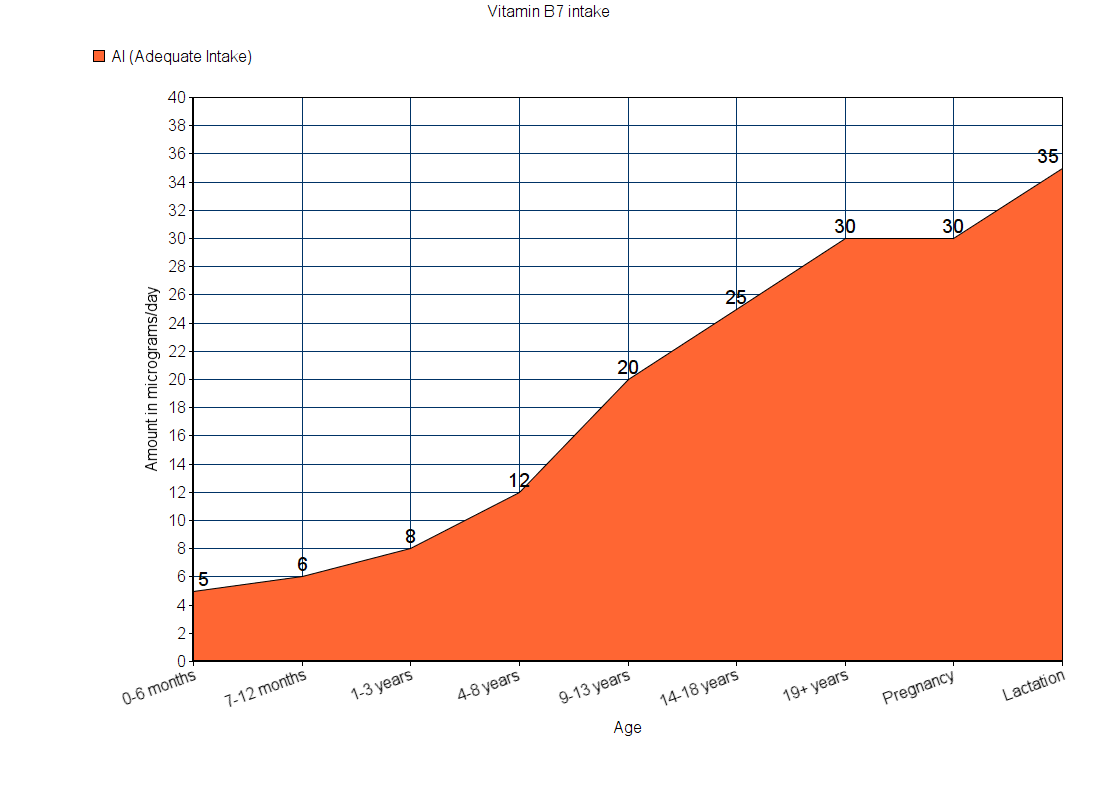
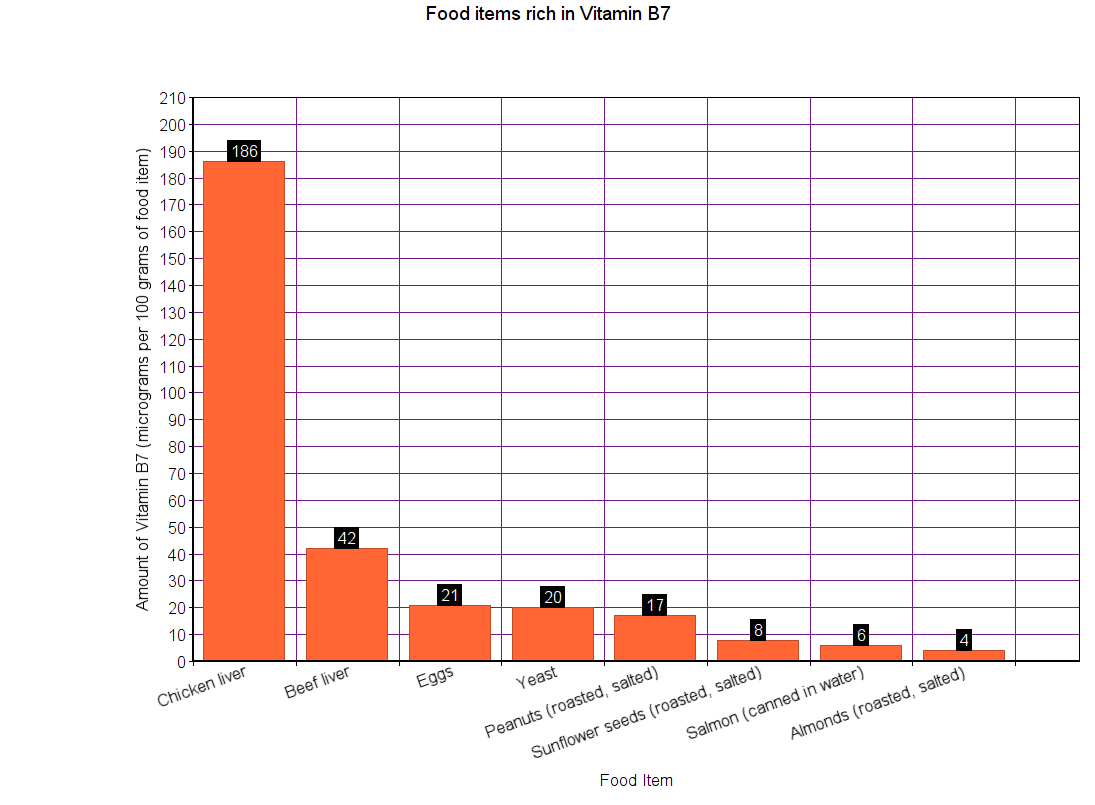
Best practices
Since vitamin B7 is not affected by heat. So, cooking does not destroy vitamin B7.
However, it is affected by water, since it is a water-soluble protein. So, when upon soaking or boiling in water, the vitamins seep into the water from the food items. So, use as less water as possible while cooking and avoid soaking in water.
Who should take supplements?
While vitamin B7 deficiency is pretty rare among healthy people, it can still occur. In general, people who belong to the following categories might suffer from vitamin B7 deficiency.
- People who are fed intravenously for extended periods
- People who take antibiotics or anti-seizure medicines for long periods
- Pregnant women (may develop marginal deficiency)
- People who consume raw egg whites
- Excessive alcohol drinkers
- Smokers
- People whose intestines have trouble absorbing vitamins
People who fall under these categories might benefit from vitamin B7 supplements. But, it is advisable to consult your doctor first before taking supplements.
How long does it take for your body to absorb the vitamin completely?
Almost 90% of the vitamin B7 you eat is absorbed within 24 hours.
How long does the vitamin stay in the body?
Most of the vitamin B7 does not stay in your body for more than 24 hours.
What happens to any excess of the vitamin you consume?
Urination rapidly removes excess vitamin B7.
Food vs. supplement
The natural form of vitamin B7 might be absorbed better and could be more effective.
Identify the vitamin – 7
It got its name from the Latin word ‘folium,’ meaning leaf because it was first isolated from spinach leaves.
This vitamin is essential for the formation of new cells, especially during rapid-growth periods like infancy, childhood, adolescence, and childbirth.
It is needed for the production of RNA and DNA, making red and white blood cells in the bone marrow, and for breaking down proteins and carbohydrates in the food.
Along with B6 and B12, it helps reduce the amount of homocysteine in your body. As a result, the chances of heart diseases and stroke are reduced.
It might also help improve the body’s response to antidepressants.
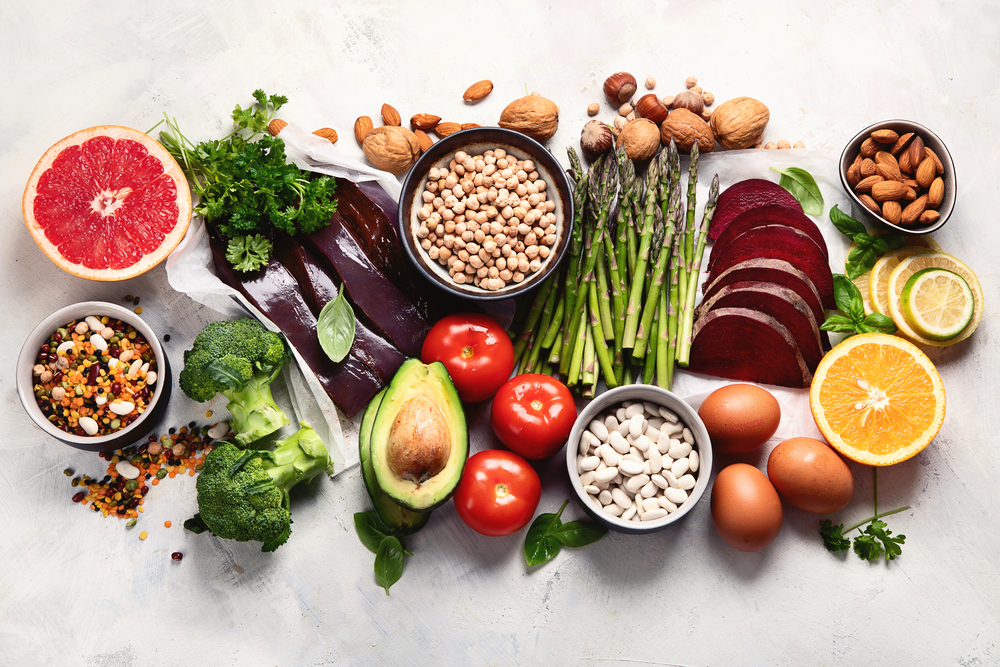
Deficiency
Since this vitamin is vital for cell growth, its deficiency can cause impaired growth.
Deficiency during pregnancy can cause defects in the infant’s brain or spine and might increase the chances of miscarriage. So, pregnant women need to take at least 600 micrograms of this vitamin every day.
Due to its importance in creating red blood cells, its deficiency can cause anemia.
Symptoms include fatigue, shortness of breath, irritability, headache, and inability to concentrate.
Overconsumption
Overconsumption of this vitamin may increase the risk of seizures.
It can make it difficult or impossible to detect a vitamin B12 deficiency. This can be dangerous since the lack of B12 can damage your nerves permanently and even cause paralysis.
Which vitamin is it?
Vitamin B9 (Folic Acid or Folate)
Sources
For infants less than a year old, RDA couldn’t be calculated. So, AI is used instead. For these age groups, no UL data is available.
Note: All the values are in micrograms.
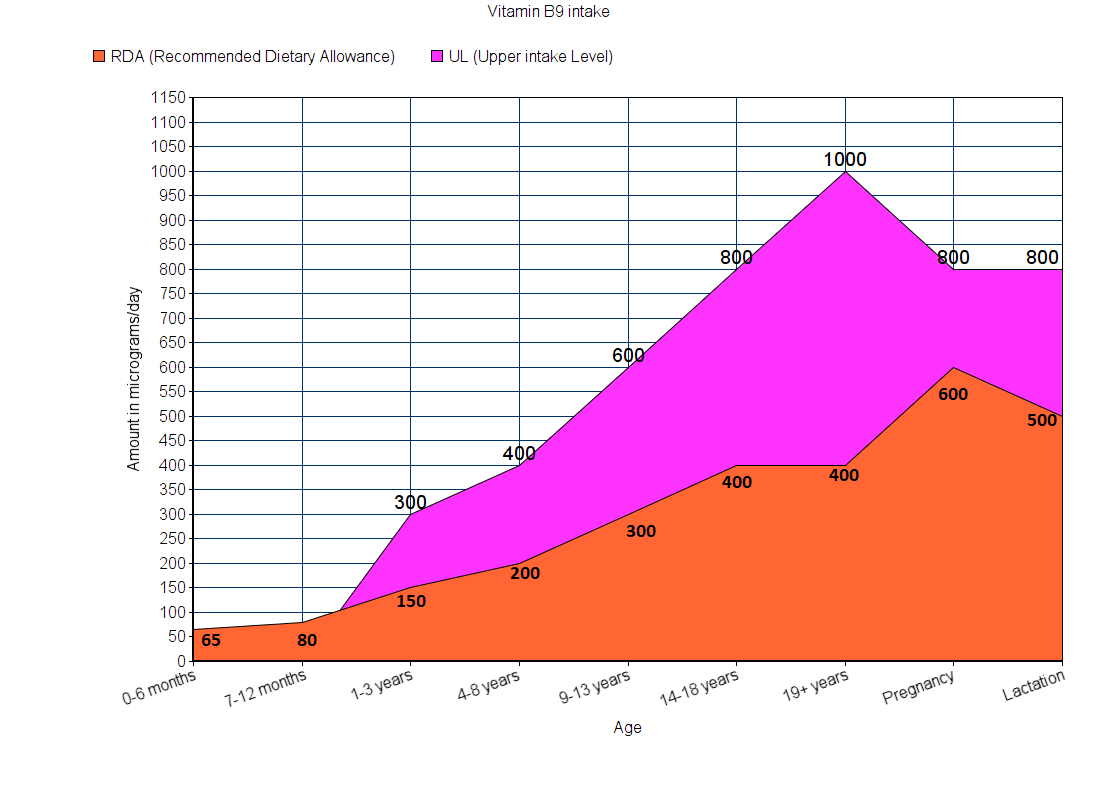
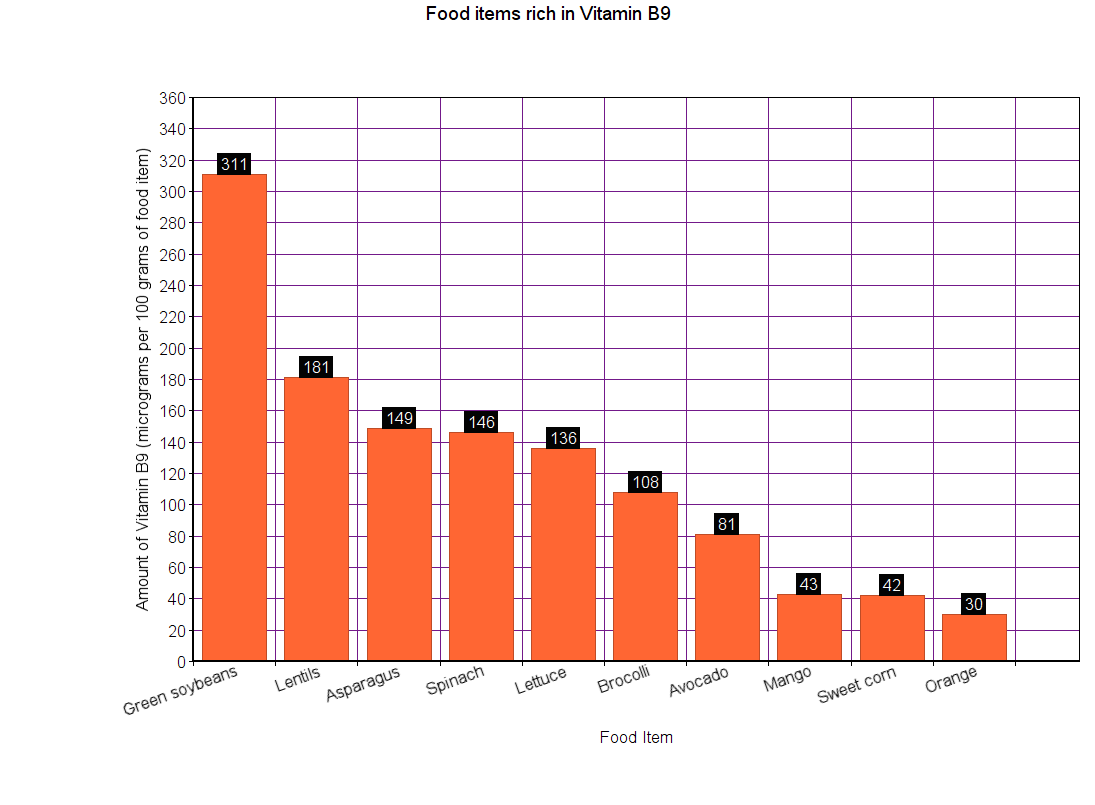
Best practices
How to absorb vitamin B9 better?
Vitamin B9 can create various health problems when consumed in excess. Hence, it is always safe to eat it as a part of a varied, nutritious diet.
Vitamin B9 is easily destroyed by heat. So eating overcooked vegetables might actually cause a deficiency of vitamin B9. So, try to get most of your vitamin B9 from raw fruits and vegetables.
Who should take supplements?
The deficiency of this vitamin is rare among healthy individuals and rare on its own. It normally occurs along with other vitamin deficiencies and may be caused by a poor diet. So, unlike healthy individuals, the below groups of people might benefit from vitamin B9 supplements.
If B9 reaches high levels, it will be difficult to detect a B12 deficiency. So, take a vitamin B12 test before starting a B9 supplement to make sure that you don’t have a B12 deficiency.
- People who drink excessive alcohol
- People with kidney disease
- Women who are pregnant, planning to get pregnant or lactating
- People who suffer from folic acid (B9) deficiency anemia
- People who take medications (for seizures, cancers, and rheumatoid arthritis) that affect the body’s ability to absorb vitamin B9.
Even though taking vitamin B9 supplements can be beneficial in certain cases, it is advisable to consult your doctor first.
How long does it take for your body to absorb the vitamin completely?
Vitamin B9 has an absorption rate of almost 100% when eaten along with food. Most of the vitamin B9 you eat is absorbed within 24 hours. The absorption rate might reduce when eaten without food.
How long does the vitamin stay in the body?
Almost all of the vitamin B9 is excreted within 24 hours.
What happens to any excess of the vitamin you consume?
Excess B9 you consume is removed through the urine. However, overdosage may reduce its absorption rate.
Food vs. supplement
Natural vitamin B9 has an absorption rate of 100%, whereas synthetic B9 has an absorption rate of 85%. On the other hand, synthetic B9 is cheaper.
Identify the vitamin – 8
This is the only vitamin that contains a metal – Cobalt.
This vitamin is crucial for the normal functioning of the nervous system and the brain. It helps in forming a protective sheath around the nerves so that impulses can travel faster. It is also important for the creation of neurotransmitters (serotonin and dopamine). These neurotransmitters regulate your sleep, mood, movement, eating, and help us in experiencing pleasure.
Like other B-vitamins, this vitamin also plays a major role in converting fats and proteins into energy.
It is essential for cell division, building genetic material (DNA), and the creation of red blood cells.
Along with B6 and B9, it helps reduce the amount of homocysteine in your body. As a result, the chances of heart diseases and stroke are reduced.

Deficiency
The human liver can store excess amounts of this vitamin for up to four years. So, even if you are deficient, it may take several years for any symptoms to show up.
Vegans are at a greater risk of this deficiency because this vitamin is only found in animal products.
The deficiency of this vitamin can cause irreversible damage to the brain and the nervous system. It can also cause anemia.
Some of the symptoms include:
- Fatigue and shortness of breath
- Soreness in mouth and tongue
- Loss of appetite, constipation and weight loss
- Tingling in the arms and legs, numbness and difficulty maintaining balance
- Anxiety, confusion, hallucinations, depression, and memory loss
Overconsumption
Since the body can absorb only a small portion of this vitamin, overconsumption of it is not considered dangerous. Indeed, the last occurrence of its toxicity was in 2001.
Which vitamin is it?
Vitamin B12 (Cobalamin)
Sources
For infants less than a year old, RDA couldn’t be calculated. So, AI is used instead. For these age groups, no UL data is available.
Note: All the values are in micrograms.
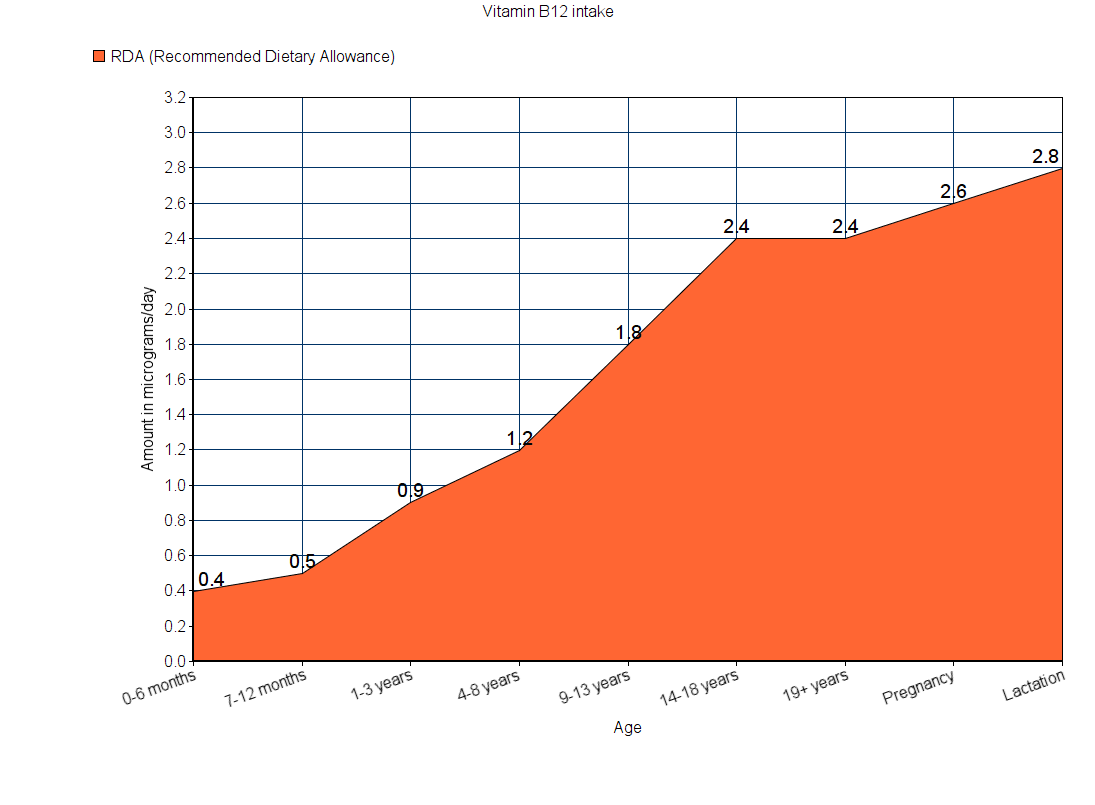
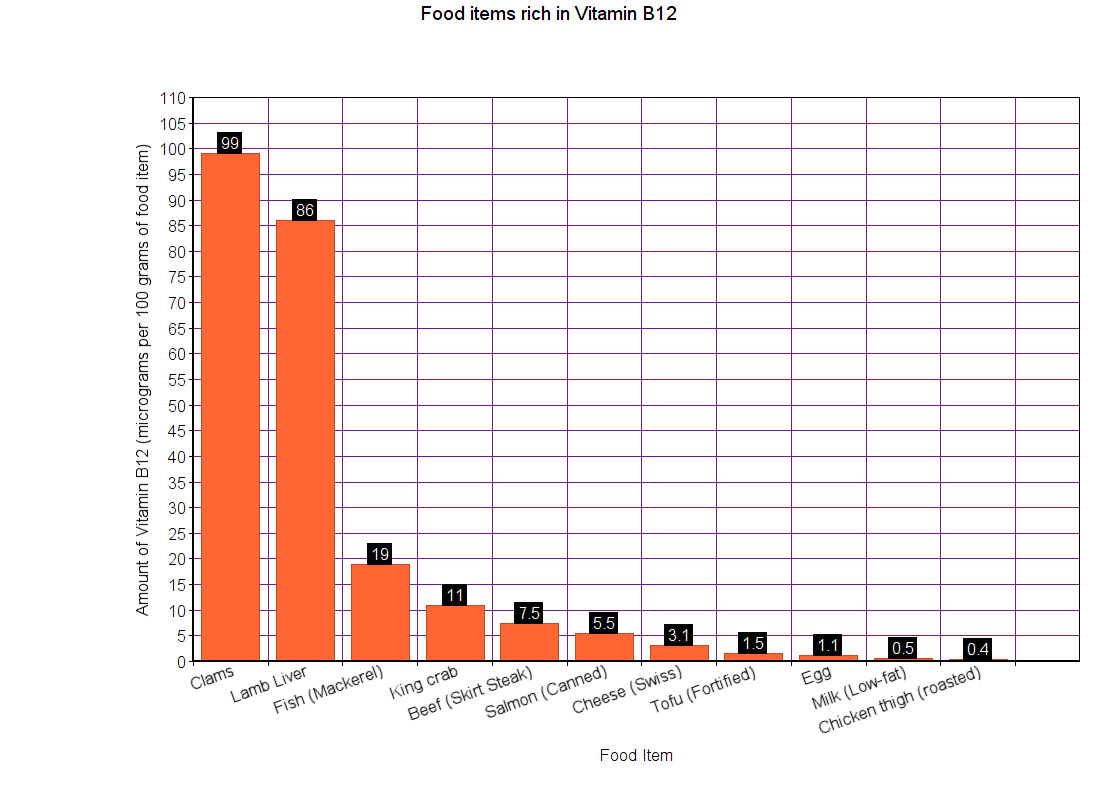
Best practices
How to absorb vitamin B12 better?
Grilling or frying the meat can destroy 20% of vitamin B12 initially present. In addition to that, boiling can also destroy vitamin B12.
So, if you cook, use as little water and oil as possible. If you boil the meat, drink the water you used to boil the meat as soup, instead of throwing it.
Who should take supplements
The following groups of people are at an increased risk of B12 deficiency and can, therefore, benefit from its supplements.
- People who suffer from an eating disorder
- People who have had weight-loss surgeries
- Older people aged 60 or more
- People who drink too much alcohol
- People who are HIV-positive
- Vegans
- People who have difficulty absorbing vitamins (Example:- Irritable bowel syndrome)
How long does the vitamin stay in the body?
Traces of this vitamin are stored in the body for up to four years.
What happens to any excess of the vitamin you consume?
Any excess amount of vitamin B12 is removed through the urine. However, high doses can cause problems.
Food vs. supplements
Natural vitamin B12 is bound to protein when we eat it. Your stomach then breaks it down to obtain the free form of this vitamin.
Synthetic B12 might be absorbed better (around 56%, when taken as a 1microgram oral dose) because it is already available in free form and therefore doesn’t need to be broken down. Moreover, natural B12 is only available in animal products. If you are a vegan, you cannot get vitamin B12 from food.
Vitamin C
Vitamin C is another water-soluble vitamin that performs several vital functions in your body. You can read about it in detail here: Vitamin C.

Leave a Reply